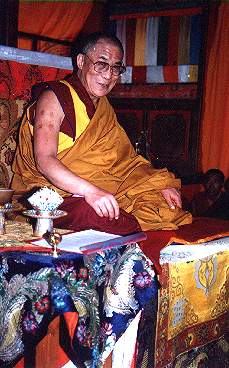2005
USA
September
11 - 14 Idaho (specific public events and venues to be finalised
later)
September 16 - 18 Teaching in Tucson, Arizona. His Holiness will teach on the 8th Chapter of Shantideva's Bodhicharyavatara at the invitation of Arizona Teaching Inc., P.O. Box 43997, Tucson, AZ 85733
Contact: 1-877-327-7187 (Toll free from outside Arizona in the US and from Canada); 1-520-327-7187 (From inside Arizona)
Website: www.arizonateaching.org
September 19 His Holiness will give a public talk/interfaith dialogue at the Tucson Convention Centre being organised by the Arizona Friends of Tibet. Contact: 520-885-6527; Email: aztibet@mindspring.com
September
20 His Holiness will give a public talk at
the University of Texas-Austin. Admission free
with ticket. Ticket distribution
Contact: Dr. Patricia
Teed, The
Texas
September 22 Houston, Texas (Programme at Rice University; details to come later)
September 24 New York City and New Jersey (His Holiness to give teaching to the Vietnamese community); Contact: Sharyye Moore at email: Airlineambnyc@aol.com or Judy Gin at email: Sumajudi@aol.com or Oanh Nguyen at email: Othienkimoanh@yahoo.com
September 25 His Holiness will give a Public Talk on "Peace, War and Reconciliation" at Rutgers University, New Jersey
Contact:
Dr. Linda G. Schulze, Assistant Vice President for Academic
Affairs,
Tel: 732-932-8068 Fax:
732-932-1956
Email: lschulze@rci.rutgers.edu
September 25 At 3:00 pm, His
Holiness will grant audience to Tibetans and Buddhists from the Himalayan
region at the Madison Square
Garden
September 26 Programme at Columbia University (details later)
San Francisco (Stanford University)
November 4 Dialogue between Religion and Neurosciences
November 5
Meditation and public talk; Discussion on Non-violence (Contact: Elaine
Enos at Phone:650-723-2551 Fax: 650-723-8231
Email: elaine.enos@stanford.edu
November 8 - 13 Programme in Washington, DC
November 8 - 10 Mind and Life Conference (Contact: Mind and Life Institute; Phone: 303-665-7659, email info@mindandlife.org
November 13 Public talk (Contact: International Campaign for Tibet) Phone: 202-785-1515, email info@savetibet.org
Contact address of visit coordinator for His Holiness' visit programmes to North and South America:
The Office of Tibet, 241 East 32nd Street, New York, NY 10016 (USA)
Tel: (212) 213-5010 Email: otny@igc.org
(The Office of Tibet, New York, is the official agency of His Holiness the Dalai Lama for the Americas)
2006
INDIA
January Kalachakra Initiation at Amravati, Andhra Pradesh (Tentative)
PLEASE NOTE:
We
are giving you the above information about His Holiness's upcoming
teachings, both confirmed and tentative, as received from the Office of
His Holiness the Dalai Lama in Dharamsala, India. However, since
changes could take place or new teaching engagements included during the
course of His Holiness' visit programmes within India and abroad, you are
welcome to contact for latest information either this office or Office of
His Holiness the Dalai Lama, P.O. Mcleod Ganj, Dharamsala (H.P.) - 176219,
INDIA Tel: [91-(0) 1892]
221343/221879, Fax: [91-(0) 1892] 221813
E-mail: ohhdl@vsnl.com
Practical advice for attending HH the Dalai Lama's teachings in India
When His Holiness the Dalai Lama gives public teachings in India you would be well advised to bring: a cushion, an FM radio, a cup, and a sunhat and given the security checks that take place, as little else as possible.
Registration
All teachings in India are free and except certain
restricted and tantric teachings prior registration is not necessary. You
should check as soon as you reach the place where the teaching is given.
It is helpful to bring few extra personal passport size photos in case
registration is suddenly required due to security or other reasons.
Seating
In the West seating for public events is, likely as not,
arranged by ticket and seat number and you keep the seat you are thus
assigned. In Tibet and India for many public events seating is on the
floor or on the ground. However, the convention amongst Tibetans is that
you take your seat on the first day of a series of teachings, mark it with
a cushion or a piece of cloth, and thereafter keep to that seat for the
duration of the teachings. This is how Tibetans have traditionally avoided
hassling each other over who sits where every day. So, following the old
adage about when in Rome do as the Romans do, it seems reasonable to
suggest that when among Tibetans do as the Tibetans do.
Translation
On most occasions when HH the Dalai Lama is teaching
publicly in India an effort is made to provide a simultaneous translation
into English. This is made available by radio. If you wish to listen to
the translation, you are advised to bring an FM radio with headphones so
as not to disturb the majority of listeners who are listening in Tibetan.
Although the quality of the signal varies according to the circumstances,
you can often improve reception by changing the angle and position of the
antenna of your radio, which is often incorporated in the headphone lead.
Tea and offerings to the monastic community
It is customary for tea
to be served to the gathering, so it is worthwhile carrying your own cup.
You will often notice that money is offered to monks and nuns. This is an
offering to the spiritual community. Both the tea and offerings are paid
for by contributions from patrons and the general public. If you would
also like to contribute there is nearly always an office near the teaching
location where you can do so. How much you give is entirely at your
discretion, but you will be given a receipt.
Protection from the sun and the weather
His Holiness the Dalai Lama
makes a point of encouraging those who are sitting in the hot sun to cover
their heads and so protect their health. Similarly he asks people to put
up umbrellas or take shelter should it rain. It is useful to carry a soft
sun hat or piece of cloth and / or a small umbrella.
Shoes
Tibetans tend to keep their shoes on when they are sitting on
the ground, or at least keep them on until they sit down. Taking your
shoes off and carrying them in your hand through a crowd sitting on the
ground means that you carry them right in front of people's faces, which
most people prefer to avoid.
[ Homepage ]


